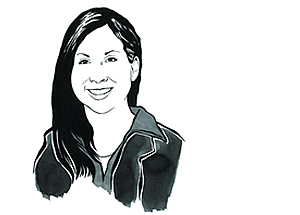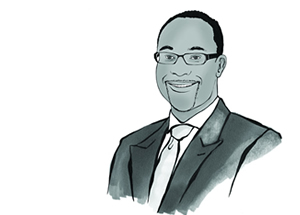ARE YOU REALLY
LOOKING FOR THE BEST?
Faculty weigh in on bias in hiring practices
LAUREN RIVERA
While diversity and inclusion initiatives have become a mainstay within many companies, the choice to hire one candidate over an-other still comes down to whom the hiring manager likes the most. Or rather, with whom they prefer to work.
Lauren Rivera and Nicholas Pearce have made a career of researching that bias. An associate professor of management and organizations, Rivera focuses on hiring and social inequality. Pearce, a clinical assistant professor of management and organiza-tions, works to get “to the bottom of a puzzle around what helps organizations grow,” he says.
Why do hiring managers skew toward hiring a particular type of applicant rather than hiring based on talent?Rivera: Buying a company based on past performance reduces risks and provides some comfort to the investor trying to predict future growth. By definition, startups offer neither historic insight nor leverageable cash flow. In an environment of slow growth, acquiring competitors rather than individual customers may be the fastest way to grow revenue, especially now, when acquisition financing is so inexpensive.
Pearce: People tend to esteem and prefer others who share social identities with them, like race, religion or gender. This can cause hiring managers to confuse how similar an individual is to them with how well an individual will perform. This is especially true in organizations that lack diversity in the management ranks, where it is easy to reach the false conclusion that the only people who have what it takes to succeed are the type of people who are already there.
How can job applicants combat hiring bias?
R: It’s hard to prescribe one strategy that works all the time because you may not know who is interviewing or evaluating your résumé. Do due diligence before the interview and find out something about your interviewer and draw upon commonalities you share. If you know about your interviewer, you can highlight things that resonate with them.
P: Hiring bias can be difficult to spot by the jobseeker, but being aware of stereotypes that are likely against you when you submit your résumé or walk in the door can be an im-portant first step. I would suggest trying to establish common ground early in the conversation by exploring shared values, interests or experiences that can serve as social glue to signal your trustworthiness and potential for success in the organization.
Is there a benefit for managers to hire dissimilar applicants?R: A lot of major law firms only hire people from the top 10 or 20 law schools with the idea that if a candidate didn’t go to those schools, they won’t be able to cut it. But there’s evidence to suggest that graduates from most elite law schools are more dissatisfied on the job and want to leave very early on. So sometimes our lay theories on what makes a good hire are just theories.
P: Potentially. Diversity of functional expertise confers clear benefits when it comes to performing complex tasks, but many organizations struggle with whether the benefits of social diversity are worth the pain. Diverse hires often provide fresh perspectives, which can facilitate sharper decision-making and more innovative problem-solving, sometimes at the expense of comfort and social cohesion. At the same time, hiring diverse talent without ensuring that there is an organizational ecosystem to support their success can be counter-productive.
Interviews condensed and edited for clarity.
 |
 |
|
| LAUREN RIVERA ASSOCIATE PROFESSOR OF MANAGEMENT AND ORGANIZATIONS xxxxxxxxxxxxxxxxxxxxxxxxxxxxxxxxxxxxxxxxxxxxxxxxxxxxxxx Before Kellogg: PhD in Sociology at Harvard University WILL BIAS ALWAYS EXIST IN HIRING PRACTICES? “Bias will always be there because it is part of our psychology. But you can put in place structures and practices that make it less likely that people will act on them, and that’s the key ” |
 |
NICHOLAS PEARCE CLINICAL ASSISTANT PROFESSOR OF MANAGEMENT AND ORGANIZATIONS xxxxxxxxxxxxxxxxxxxxxxxxxxxxxxxxxxxxxxxxxxxxxxxxxxxxxxx Before Kellogg: Leadership Fellow and Program Coordinator, Center for Leadership, Northwestern University WILL BIAS ALWAYS EXIST IN HIRING PRACTICES? “As long as human beings are involved in the decision-making process, there will be bias. But as leaders develop cross-cultural competence, they can become more proficient at interrupting their own bias before it manifests in discriminatory behavior. ” |


